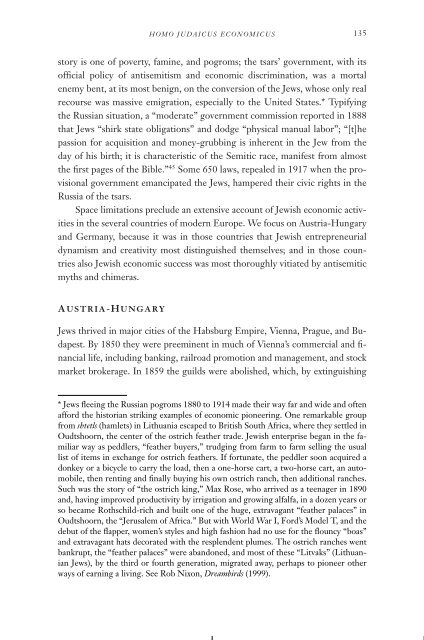41845358-Antisemitism
41845358-Antisemitism
41845358-Antisemitism
Create successful ePaper yourself
Turn your PDF publications into a flip-book with our unique Google optimized e-Paper software.
HOMO JUDAICUS ECONOMICUS<br />
135<br />
story is one of poverty, famine, and pogroms; the tsars’ government, with its<br />
official policy of antisemitism and economic discrimination, was a mortal<br />
enemy bent, at its most benign, on the conversion of the Jews, whose only real<br />
recourse was massive emigration, especially to the United States.* Typifying<br />
the Russian situation, a “moderate” government commission reported in 1888<br />
that Jews “shirk state obligations” and dodge “physical manual labor”; “[t]he<br />
passion for acquisition and money-grubbing is inherent in the Jew from the<br />
day of his birth; it is characteristic of the Semitic race, manifest from almost<br />
the first pages of the Bible.” 45 Some 650 laws, repealed in 1917 when the provisional<br />
government emancipated the Jews, hampered their civic rights in the<br />
Russia of the tsars.<br />
Space limitations preclude an extensive account of Jewish economic activities<br />
in the several countries of modern Europe. We focus on Austria-Hungary<br />
and Germany, because it was in those countries that Jewish entrepreneurial<br />
dynamism and creativity most distinguished themselves; and in those countries<br />
also Jewish economic success was most thoroughly vitiated by antisemitic<br />
myths and chimeras.<br />
AUSTRIA-HUNGARY<br />
Jews thrived in major cities of the Habsburg Empire, Vienna, Prague, and Budapest.<br />
By 1850 they were preeminent in much of Vienna’s commercial and financial<br />
life, including banking, railroad promotion and management, and stock<br />
market brokerage. In 1859 the guilds were abolished, which, by extinguishing<br />
* Jews fleeing the Russian pogroms 1880 to 1914 made their way far and wide and often<br />
afford the historian striking examples of economic pioneering. One remarkable group<br />
from shtetls (hamlets) in Lithuania escaped to British South Africa, where they settled in<br />
Oudtshoorn, the center of the ostrich feather trade. Jewish enterprise began in the familiar<br />
way as peddlers, “feather buyers,” trudging from farm to farm selling the usual<br />
list of items in exchange for ostrich feathers. If fortunate, the peddler soon acquired a<br />
donkey or a bicycle to carry the load, then a one-horse cart, a two-horse cart, an automobile,<br />
then renting and finally buying his own ostrich ranch, then additional ranches.<br />
Such was the story of “the ostrich king,” Max Rose, who arrived as a teenager in 1890<br />
and, having improved productivity by irrigation and growing alfalfa, in a dozen years or<br />
so became Rothschild-rich and built one of the huge, extravagant “feather palaces” in<br />
Oudtshoorn, the “Jerusalem of Africa.” But with World War I, Ford’s Model T, and the<br />
debut of the flapper, women’s styles and high fashion had no use for the flouncy “boas”<br />
and extravagant hats decorated with the resplendent plumes. The ostrich ranches went<br />
bankrupt, the “feather palaces” were abandoned, and most of these “Litvaks” (Lithuanian<br />
Jews), by the third or fourth generation, migrated away, perhaps to pioneer other<br />
ways of earning a living. See Rob Nixon, Dreambirds (1999).


